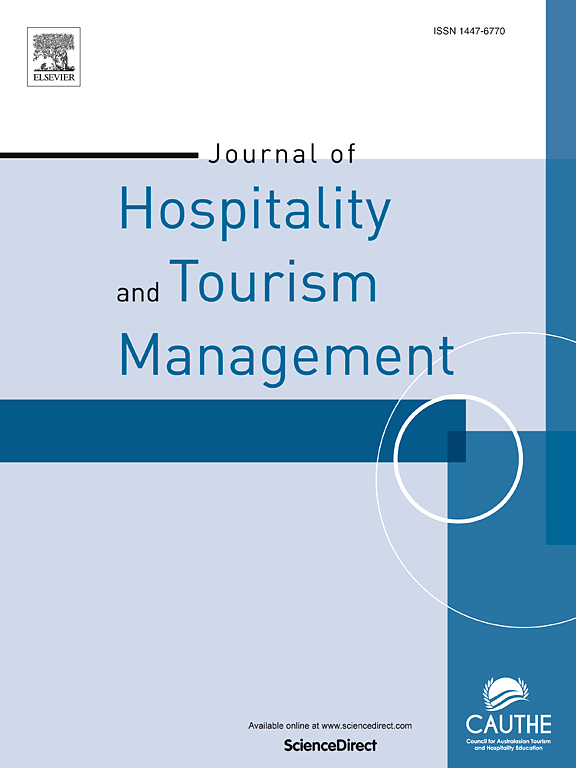Travel therapy for vulnerable populations with health conditions: A competence-environmental press model framework illustrated with dementia
IF 7.8
1区 管理学
Q1 HOSPITALITY, LEISURE, SPORT & TOURISM
引用次数: 0
Abstract
Despite growing interest in vulnerable tourists, the tourism engagement of individuals with health conditions remains under-investigated. To address this gap, this paper presents an interdisciplinary systematic review focusing on three topics: (1) vulnerable populations with health conditions in tourism and hospitality, (2) health benefits of tourism, and (3) dementia intervention and tourism. Drawing on SSCI- and SCI-listed English-language articles published between 1975 and 2025, the database searches yielded 36, 31, and 2 articles for the respective topics. Key gaps are identified, particularly the limited attention to populations with health conditions such as dementia and the insufficient understanding of tourism's potential health benefits. To address these gaps, this study adopts a theory adaptation and model building strategy to develop a conceptual framework grounded in the competence-environmental press model. The model is reinterpreted and extended to the tourism and dementia context to elucidate the interdisciplinary concept of travel therapy and its underlying mechanisms. Travel therapy shows promise as a non-pharmacological intervention for disease prevention and treatment by leveraging environmental modifications, novel cognitive and sensory stimulation, physical activities, social interactions, therapeutic landscapes, positive emotions, and vulnerability-friendly facilities and services. Future empirical research is recommended to adopt multidisciplinary approaches to investigate the travel behaviours of this vulnerable population and the therapeutic potential of tourism and its alternatives, such as virtual tourism. Implications for key stakeholders, including academics, practitioners, policymakers, and broader society, are also discussed, particularly in the context of promoting the Sustainable Development Goals and Healthy Ageing Initiatives.
有健康状况的弱势群体的旅行治疗:以痴呆症为例的能力-环境新闻模型框架
尽管人们对弱势游客的兴趣越来越大,但对有健康问题的个人的旅游参与情况的调查仍然不足。为了解决这一差距,本文提出了一个跨学科的系统综述,重点关注三个主题:(1)旅游和酒店业中健康状况的弱势群体,(2)旅游的健康效益,以及(3)痴呆症干预和旅游。根据1975年至2025年间发表的SSCI和sci列出的英语文章,数据库搜索分别获得36篇、31篇和2篇对应主题的文章。确定了主要差距,特别是对患有痴呆症等健康问题的人群的关注有限,以及对旅游业潜在健康益处的了解不足。为了解决这些差距,本研究采用理论适应和模型构建策略,以能力-环境新闻模型为基础,建立了一个概念框架。该模型被重新解释并扩展到旅游和痴呆的背景下,以阐明旅游治疗的跨学科概念及其潜在机制。旅行疗法通过利用环境改变、新的认知和感官刺激、身体活动、社会互动、治疗景观、积极情绪以及易受伤害的设施和服务,有望成为疾病预防和治疗的非药物干预手段。未来的实证研究建议采用多学科方法来调查这一弱势群体的旅游行为以及旅游及其替代方案(如虚拟旅游)的治疗潜力。还讨论了对包括学术界、从业人员、政策制定者和更广泛社会在内的主要利益攸关方的影响,特别是在促进可持续发展目标和健康老龄化倡议的背景下。
本文章由计算机程序翻译,如有差异,请以英文原文为准。
求助全文
约1分钟内获得全文
求助全文
来源期刊
CiteScore
13.30
自引率
8.40%
发文量
177
审稿时长
45 days
期刊介绍:
Journal Name: Journal of Hospitality and Tourism Management
Affiliation: Official journal of CAUTHE (Council for Australasian Tourism and Hospitality Education Inc.)
Scope:
Broad range of topics including:
Tourism and travel management
Leisure and recreation studies
Emerging field of event management
Content:
Contains both theoretical and applied research papers
Encourages submission of results of collaborative research between academia and industry.

 求助内容:
求助内容: 应助结果提醒方式:
应助结果提醒方式:


